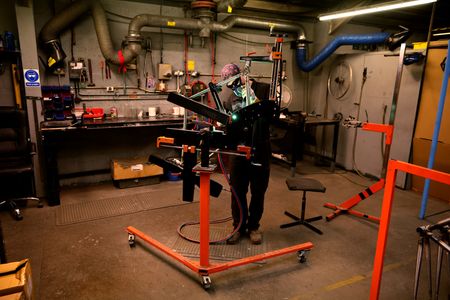By William Schomberg
LONDON (Reuters) – British factories reported another tough month in January as output, new orders and employment all fell, with companies hit by higher costs even before payroll taxes and the minimum wage go up in April, a survey showed on Monday.
In a latest sign of an economic slowdown ahead of Thursday’s expected interest rate cut by the Bank of England, the S&P Global Purchasing Managers’ Index for UK manufacturing remained below the 50-mark that divides growth from contraction for a fourth month in a row.
There was a slight easing in the pace of contraction as the index rose to 48.3 in January from 47.0 in December – a fraction above a preliminary estimate for January of 48.2.
Confidence rose only slightly from December’s two-year low and the survey’s measure of staffing fell by the most since February last year.
“A stagnant economy and rising cost burdens leave policymakers with a real dilemma, balancing the need for rate cuts to support flagging growth and a declining labour market against the need to contain inflationary pressures,” Rob Dobson, a director at S&P Global Market Intelligence, said.
The BoE looks set to lower its economic growth forecast for 2025 on Thursday and cut its Bank Rate to 4.5% from 4.75%.
The central bank is also likely to raise its inflation projection for the year as businesses pass on to consumers at least some of their higher tax burden and other costs.
The manufacturing PMI survey showed firms were hit with the strongest purchase price inflation in two years last month, pushed up by the costs of raw materials and transportation. Companies increased their prices for the 15th month in a row.
Small firms suffered the biggest drop in output and orders and made the deepest cuts to staffing levels.
Britain’s economy has shown almost no growth since the July election which brought Prime Minister Keir Starmer’s Labour Party into power. Many companies blame this on the new government’s downbeat message about the outlook and then its announcement of higher social security contributions for employers.
Last week, finance minister Rachel Reeves spelled out her plans to get Britain on a faster growth track with a focus on speeding up planning decisions and offering her support for an expansion of London’s Heathrow Airport. However, those measures could take years to impact the economy.
The final January PMI for Britain’s much larger services sector will be published on Wednesday.
(Writing by William Schomberg; Editing by Christina Fincher)









